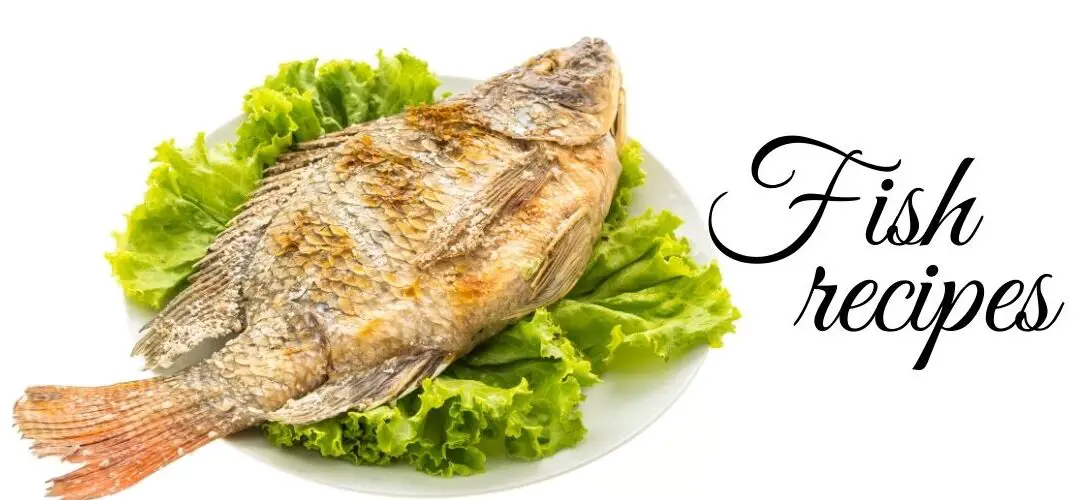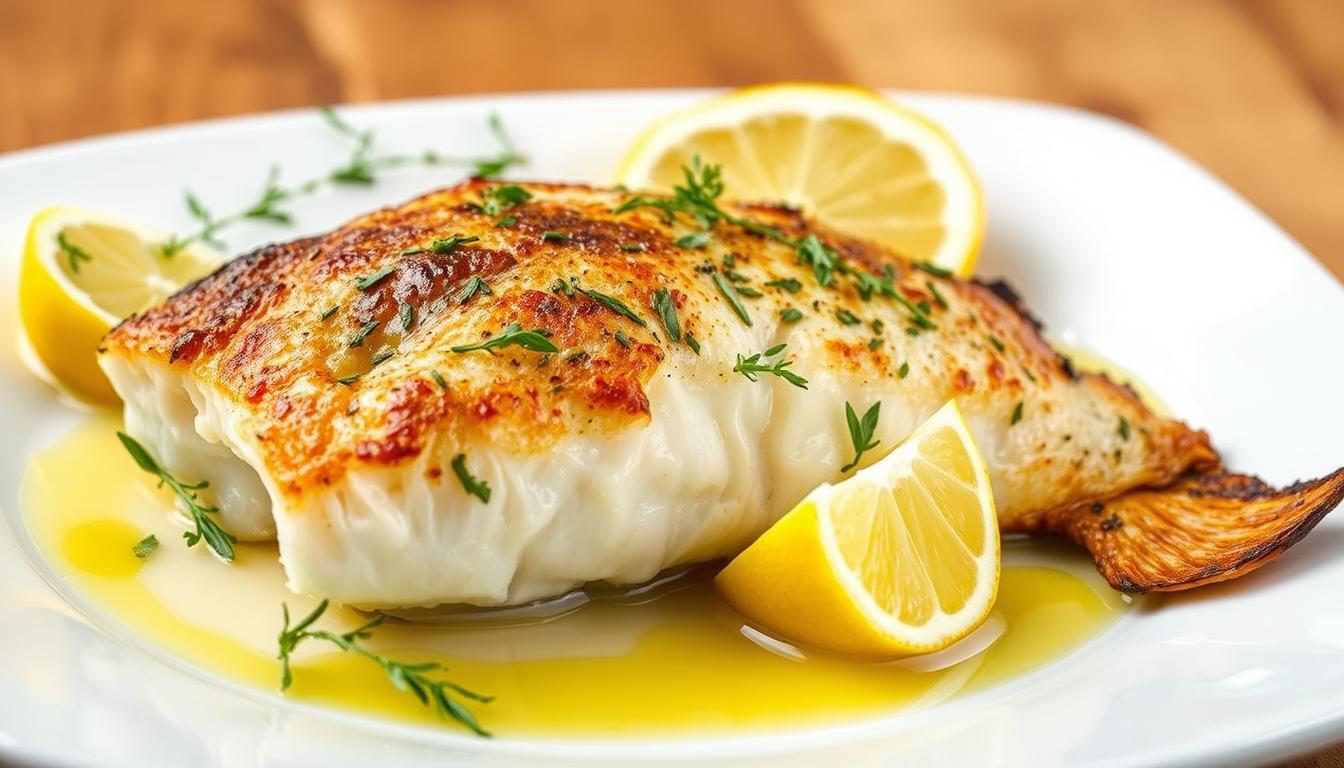How to Make the Perfect Baked Haddock Recipe at Home
Imagine turning a simple white fish into a dish that excites your taste buds and is good for you. The baked haddock recipe is your key to a quick, healthy seafood dinner. It promises top-notch results right in your kitchen.
Seafood recipes might seem scary, but this easy method makes them accessible. Haddock’s mild taste and soft texture are perfect for your creativity. This recipe is great for both experienced cooks and beginners.
Cooking fish doesn’t have to be hard. With a few basic ingredients and the right techniques, you’ll make a tasty dish full of protein and nutrients. You’ll learn how to make a delicious haddock meal that will wow your loved ones.
Next, we’ll explore how to pick the best haddock, get the cooking temperatures right, and find flavor combinations that will take your seafood to the next level. Get ready to improve your home cooking with this easy baked haddock recipe.
Table of Contents
What Makes Haddock Special
Haddock has a mild, slightly sweet flavor. Its lean nature makes it incredibly versatile in various culinary preparations. Key characteristics include:
- Delicate, flaky texture
- Low fat content
- Mild, sweet flavor profile
- Excellent for baking and other cooking methods
Selecting Fresh vs. Frozen Haddock
When choosing haddock for your fish dishes, consider these selection tips:
- Fresh haddock should have a clean, ocean-like smell
- Look for firm, white flesh without discoloration
- Frozen haddock can be equally good if properly stored
Nutritional Benefits of Haddock
A serving of haddock packs impressive nutritional value for health-conscious food lovers:
| Nutrient | Amount per Serving |
|---|---|
| Calories | 142 |
| Protein | 24g |
| Fat | 10g |
| Vitamin A | 213 IU |
Pro tip: Haddock is an excellent protein source with minimal calories. It’s perfect for those seeking nutritious New England cuisine options.
Essential Ingredients for Baked Haddock Recipe
Starting a delicious lemon garlic fish dish for weeknights is all about the right ingredients. Your baked haddock recipe needs a special mix to turn simple fish into a memorable dinner.
The base of your dish is fresh haddock fillets. Here are the key ingredients to make your seafood dish stand out:
- 2 pounds fresh haddock fillets
- 3 tablespoons butter
- 3 garlic cloves, minced
- 1 tablespoon olive oil
- Fresh lemon
- ½ teaspoon onion powder
- Salt and black pepper to taste
Quality ingredients are crucial for your lemon garlic fish. Fresh garlic adds depth, and butter makes it rich. The lemon’s bright, citrusy flavor complements the haddock beautifully.
| Ingredient | Quantity | Purpose |
|---|---|---|
| Haddock Fillets | 2 pounds | Main protein |
| Butter | 3 tablespoons | Adds richness |
| Garlic | 3 cloves | Provides flavor depth |
| Olive Oil | 1 tablespoon | Helps with cooking |
Pro tip: For easy weeknight meals, prep your ingredients in advance to streamline the cooking process.
Your nutrition breakdown per serving is impressive: 26g protein, only 1g carbohydrates, and just 233 calories. Baked haddock is a great choice for those who want a quick, healthy dinner.
Perfect Temperature and Timing for Baked Haddock
Mastering oven-baked fish is all about precision. When cooking haddock, getting the temperature and timing right is key. This ensures your fish is delicious and full of flavor.
Optimal Oven Temperature Settings
The best temperature for baking haddock is between 350°F and 425°F. This range helps your fish cook evenly and stay moist. Chefs often set their ovens to 425°F for a crispy outside and a soft inside.
- Low temperature: 350°F (slower cooking)
- Recommended temperature: 425°F (faster, crispier results)
- Avoid temperatures above 450°F to prevent burning
Cooking Duration Guidelines
The cooking time depends on the haddock’s thickness. For 1 1/2 pounds of fish, cut into 6-ounce portions, 16-20 minutes is usually best.
| Fillet Thickness | Cooking Time | Recommended Temperature |
|---|---|---|
| Thin fillets (1/2 inch) | 12-15 minutes | 425°F |
| Medium fillets (3/4 inch) | 16-20 minutes | 425°F |
| Thick fillets (1 inch) | 20-25 minutes | 350°F |
Signs of Perfectly Cooked Fish
Knowing when your fish is done is important. Look for these signs:
- Flaking texture: Fish should separate easily with a fork
- Opaque white color throughout
- Internal temperature reaches 145°F
- Moist and tender appearance
Pro tip: Use a meat thermometer to ensure precise doneness and prevent overcooking your delicate haddock.
Step-by-Step Preparation Techniques
Creating tasty seafood recipes for weeknights begins with the right prep. Baked haddock needs careful handling for a dish that’s both flavorful and moist.
Start by drying your haddock fillets well with paper towels. This removes excess moisture. Then, cut 2 pounds of haddock into 6 even pieces for even cooking. Season with your favorite spices and herbs.
Next, prepare a baking dish with a light coating of olive oil or butter. This helps the fish cook evenly.
The secret to great seafood recipes lies in the details. Moisture is key when baking fish. Here are some tips:
- Use bread crumbs or crushed Ritz crackers for a crispy topping
- Add a splash of white wine or lemon juice to the baking dish
- Avoid overcrowding the fish to ensure even cooking
Pro Chef Tip: Always start with the freshest haddock you can find for the most delectable easy weeknight meals.
| Preparation Step | Key Details |
|---|---|
| Fish Preparation | Pat dry, cut into 6 pieces |
| Seasoning | Herbs, spices, bread crumbs |
| Baking Temperature | 350°F |
| Cooking Time | 20-25 minutes |
Your baked haddock is done when it flakes easily and looks opaque. Store leftovers in the fridge for up to 3 days. This way, you can enjoy these recipes all week.
Garlic Butter and Seasoning Combinations
Improving your haddock recipe begins with the right seasoning mix. New England cuisine loves seafood with deep, aromatic tastes. It turns simple fish into a true culinary delight.
For a lemon garlic fish dish, the right mix of ingredients is key. Your choice of seasonings will set the flavor depth and complexity of your baked haddock.
Classic Garlic Butter Sauce
A traditional garlic butter sauce enhances haddock’s delicate taste. Here’s a simple recipe for a delicious base:
- 3 tablespoons unsalted butter
- 3 cloves of garlic, minced
- 1 tablespoon fresh parsley, chopped
- ½ teaspoon sea salt
- ¼ teaspoon black pepper
Herb and Spice Variations
Try different herb mixes for unique flavors. The goal is to match delicate fish with the right seasonings.
| Herb Combination | Flavor Profile |
|---|---|
| Thyme and Lemon | Bright, citrusy notes |
| Dill and Paprika | Warm, slightly smoky taste |
| Rosemary and Garlic | Robust, earthy flavor |
Lemon and Wine Additions
Adding white wine and fresh lemon juice can elevate your lemon garlic fish. Pro tip: Use dry white wine like Sauvignon Blanc for depth without overwhelming the haddock.
- 2 tablespoons fresh lemon juice
- ¼ cup dry white wine
- Zest of one lemon
Learning these seasoning techniques will help you make a top-notch lemon garlic fish. It will showcase New England cuisine in your kitchen.
Tips for Storage and Reheating
Keeping the taste of your baked haddock fresh is key for quick and healthy meals. Storing it right lets you enjoy it for days after you make it.
Here’s how to store leftover haddock:
- Cool the fish completely before refrigerating
- Store in an airtight container
- Keep refrigerated at 32°F to 38°F
- Consume within 3-4 days for optimal taste and safety
To reheat your haddock without drying it out, try these methods:
- Oven method: Preheat to 350°F, reheat for 8-12 minutes
- Stovetop method: Use medium-low heat for 6-8 minutes
- Microwave method: Heat for 1-2 minutes, covering with a damp paper towel
If you want to keep it longer, freezing is a great choice. Wrap it tightly in freezer-safe packaging and store for up to 2-3 months. Thaw it in the fridge for 12-24 hours before reheating.
| Storage Method | Duration | Best Practice |
|---|---|---|
| Refrigerator (Airtight Container) | 3-4 days | Cool completely before storing |
| Freezer | 2-3 months | Wrap tightly, remove air |
Follow these tips to turn your baked haddock into easy meals. You’ll keep its taste and nutrients intact.
Conclusion
Your baked haddock recipe is more than just a meal. It’s a way to cook healthy and turn simple ingredients into a nutritious dish. With only 77 calories per 3-ounce portion and 17 grams of protein, it shows that fish can be both tasty and good for you.
Learning to cook haddock opens up new culinary possibilities. You’ve found a low-mercury seafood option that’s full of nutrients and versatile. By mastering this recipe, you can try different herbs, seasonings, and cooking methods to match your taste.
Cooking great seafood is all about being precise and patient. Whether you’re new or experienced, this baked haddock recipe is a great start. Try adding garlic butter, different herbs, and changing the baking time to make it your own.
We encourage you to share your cooking and try new things. Your kitchen is a place for creativity, and this haddock recipe is just the start. Enjoy making nutritious, delicious meals that are good for your body and soul.

